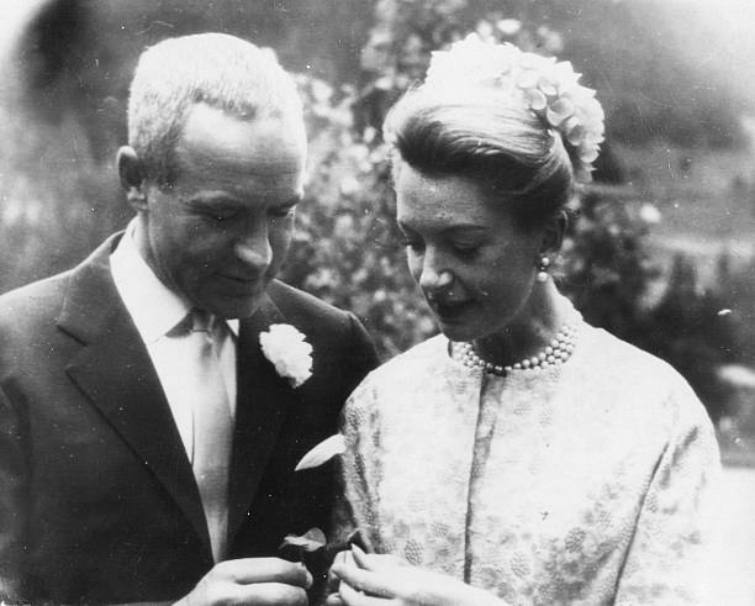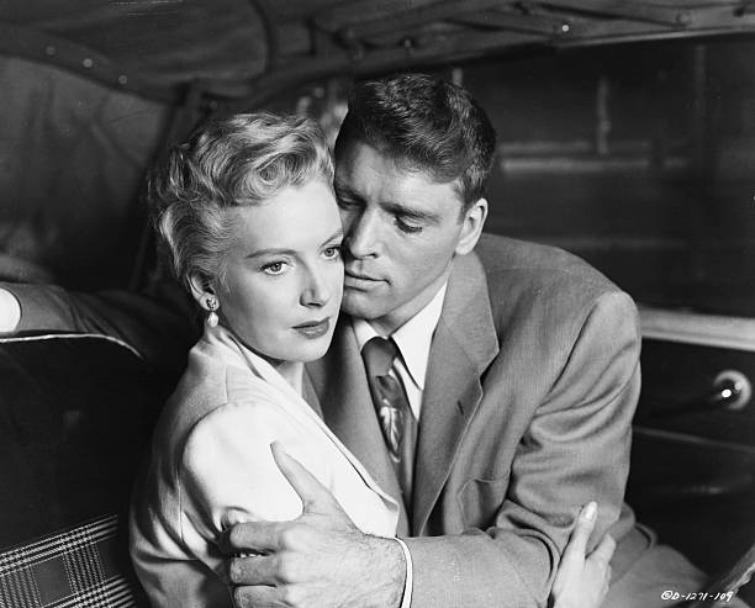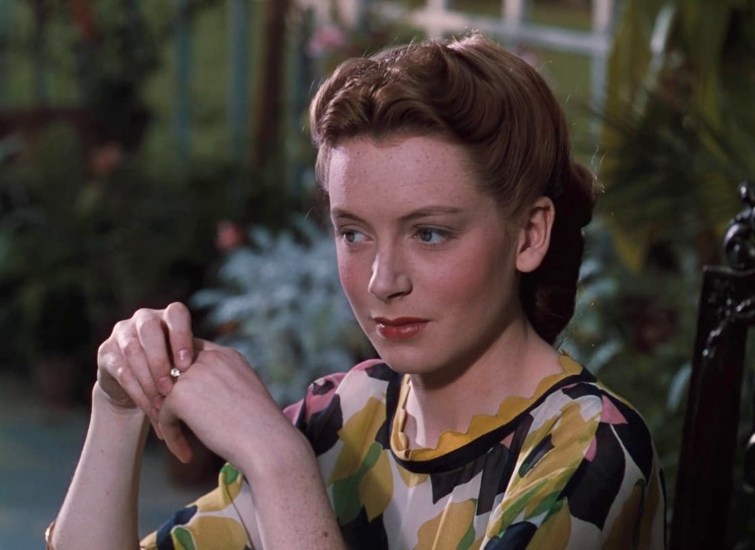CENTENNIAL DEBORAH KERR
This year I'm celebrating the 100th birth anniversary of some actors I like. I've already done this with Lana Turner and Alexis Smith (click on their names to go to the tribute posts) and now I want to dedicate a post to Deborah Kerr. She has her centennial today (the 30th of September). I'll give a short bio first and then I'll list the films I've seen of her so far.
“I still think of Audrey Hepburn as the princess, but Deborah Kerr as the queen.” — William Wyler
Deborah Kerr (30 September 1921 – 16 October 2007) was born in Glasgow, Scotland, as Deborah Jane Trimmer. Already at a young age, little Deborah wished to be a performer in the arts and had an interest in dance and theater. While she trained to be a ballet dancer at the Sadler's Wells ballet school in London, being shy and insecure, she discovered she could express her feelings in acting and made several appareances as a stage actress at the end of the 1930s. Thanks to these theater appearances, she attracted the attention of producer Gabriel Pascal, who offered her a part in the film Major Barbara (1941), an adaptation of the play by George Bernard Shaw, starring Wendy Hiller and Rex Harrison (Gabriel Pascal also directed). (Actually Kerr's first film role was in Contraband (1940) as a cigarette girl but her scenes were cut.)
She had adopted the name Deborah Kerr when she became a film actress (her family name 'Kerr' went back to the maternal grandmother of her grandfather Arthur Kerr Trimmer). During the 1940s she became one of the principal actresses of the British cinema and played, among others, in films by Michael Powell/Emeric Pressburger The Life and Death of Colonel Blimp (1943) and Black Narcissus (1947), which have become acclaimed classics.
It was only a matter of time before she was discovered by Hollywood and she made her debut in the film The Hucksters (1947), playing with none other than Clark Gable and Ava Gardner. This Hollywood debut meant the first of many films she would appear in. Because of her British accent and manner she found herself typecast as proper and reserved English ladies and soon got tired of it. She said about this: "I came over here [Hollywood] to act, but it turned out all I had to do was to be high-minded, long suffering, white-gloved and decorative." The role she is best known for is a departure from those types. Fred Zinnemann gave her a chance and cast her as an adulterous and sexually frustrated army wife in From Here to Eternity (1953). The beach scene where she's rolling in the surf with Burt Lancaster is legendary.
At the end of the 1960s Kerr decided to stop making motion pictures and dedicated herself to the theater (always to remain her first love) and television. While it was said that she had made the decision because of an increasing amount of explicit sexual content and violence in films, in 1973 she stated her principal reason: it had been due to the "big changes" in the film industry, which "had become a sort of money making machine out of the worst part of our selves and our lives. I hadn't wanted to be a part of that.".
Kerr is known for being nominated 6 times for an Oscar for Best Actress but never won. Her Academy Award nominations are for the following films: Edward, My Son (1949), From Here to Eternity (1953), The King and I (1956), Heaven Knows, Mr. Allison (1957), Separate Tables (1958) and The Sundowners (1960).
In 1994 she received an Honorary Oscar for lifetime achievement, presented to her by Glenn Close, another actress known for multiple Oscar nominations but no wins. In her introduction speech Close captures the essence of Miss Kerr:
“She has made 44 movies, light romances and dark ones, epic adventures and costume dramas, comedies and even one of our most-beloved musicals. She played nuns and nannies, nice ladies and occasionally ladies who weren't so very nice, but always a lady. If there was a main line to her career, it was as a surrogate mum to troubled teenagers, to haunted children, and most often to men who had somehow forgotten to grow up, until they met her, that is. In her singular way, she combines warmth with elegance, passion with patience, common sense with uncommon wit, great strength with even greater vulnerability. For three decades she has been a radiant presence on our screens. This year the Academy's Board of Governors has awarded an honorary Oscar to this lovely woman whose name is ... Deborah Kerr.”
“I’d love to be remembered as a good actress, but, above all, as a good human being.” — Deborah Kerr
I have always liked Deborah Kerr, her elegance and style, always a lady indeed. Yet she also seemed a bit distant, with a cool reserve, and therefore I was pleasantly surprised to discover a couple of interviews with her on YouTube (here) — a compilation of clips from Picture Parade (1956), Parkinson (1972) and Deborah Kerr: Not Just an English Rose (1986) — where she is very lovely (especially in Picture Parade), not a bit off-standish and also displaying a good sense of humour. I loved to learn certain facts from these interviews. In Picture Parade she talks about The King and I and that her favourite songs from the musical are Shall We Dance? and Getting To Know You. She believes that once in an actor's lifetime a really wonderful part comes along and for her it's the role of Mrs. Anna, her Scarlett O'Hara. The interview is from 1956, so I wonder if she still felt the same after all the other wonderful roles she played. In Parkinson Kerr mentions Spencer Tracy as a marvellous actor and she praises the fantastic comedy timing of Cary Grant. In the clip from Deborah Kerr: Not Just an English Rose she tells about her longing to go to Africa and how she wanted to make The African Queen, but because it belonged to Warner Brothers, it wasn't possible. Yet she could do King Solomon’s Mines and she tells about how great an experience it had been, despite the many discomforts of location shooting and her leading man Stewart Granger being covered with mosquito bites. She also says how it was always a laughing matter for her how her character cut off her glorious long red hair and had a perm after that without a hair out of place. She mentions The Grass is Greener as a fun movie to make because of her old sparring partners Robert Mitchum and Cary Grant, and in regard to The Sundowners (for which she was awarded her sixth Oscar nomination) she says: "I loved that movie. I should have won that year. I should have!"
Kerr had three frequent male co-stars and developed friendships over the years with all of them. She played with David Niven in Separate Tables (1958), Bonjour Tristesse (1958), Eye of the Devil (1966), Casino Royale (1967) and Prudence and the Pill (1968); with Cary Grant in Dream Wife (1953), An Affair to Remember (1957) and The Grass Is Greener (1960); and with Robert Mitchum in Heaven Knows, Mr. Allison (1957), The Sundowners (1960), The Grass Is Greener (1960) and the television drama Reunion at Fairborough (1985). I think her chemistry with all three of them is great and very natural. After having seen Kerr and Mitchum together this month in Heaven Knows, Mr. Allison and The Sundowners, I might like her pairing with Mitchum best.
A fun fact: when they met for their first film Heaven Knows, Mr. Allison, Mitchum expected Kerr to be prim and proper, like the characters she frequently played. So it came as a surprise when he heard her swear at director John Huston during one take and, being in the water at that very moment, he almost drowned laughing. They immediately struck up a friendship which lasted until Mitchum's death. Kerr said about him: "I admire Mitchum very much for the simple reason that he happens to be a super actor and contrary to public opinion, he is the most amazingly sensitive and poetic man."
Regarding her romantic life, Kerr was married twice. Her first marriage was to RAF Squadron Leader Tony Bartley from 1945 until 1959 and they had two daughters, Melanie (born in 1947) and Francesca (1951). Their marriage didn't last, mainly to do with Bartley's jealousy of his wife's financial success and fame. In 1960 Kerr married author Peter Viertel. Viertel already had a daughter (Christine) and the couple didn't have children of their own. In February 1961 Kerr had a miscarriage while being two months pregnant with Viertel's baby.
Kerr lived in Klosters (Switzerland) and Marbella (Spain) after retiring from acting, but when her health deteriorated, she moved back to Britain to be closer to her children. It was in Botesdale, a village in the county of Suffolk, England, that Kerr died at the age of 86 on 16 October 2007 from Parkinson's disease. On 4 November, only three weeks after her death, her husband Peter Viertel died of cancer.
This month I'm catching up on watching Deborah Kerr films. So far I've seen 21 of her films in total, here listed in watching order (except for the childhood viewings):
*Young Bess (seen in childhood and never again since)
*From Here to Eternity (seen in childhood and I don't think ever again after that)
*Quo Vadis (first seen in childhood, seen multiple times)
*The King and I (first seen in childhood, multiple times since then)
*An Affair to Remember (cannot remember when I've seen this first, but seen multiple times, also rewatched in February 2015 and seen on the big screen in August 2021)
*The Night of the Iguana (first seen when I was living in Amsterdam, rewatched on the big screen in July 2017)
*Separate Tables (August 2015)
*The Life and Death of Colonel Blimp (January 2016)
*Black Narcissus (January 2016)
*The Grass Is Greener (August 2017, seen on the big screen)
*The Innocents (December 2017)
*Thunder in the East (April 2019)
*The End of the Affair (February 2021)
*The Chalk Garden (September 2021)
*Bonjour Tristesse (September 2021)
*Tea and Sympathy (September 2021)
*King Solomon’s Mines (September 2021)
*The Sundowners (September 2021)
*Heaven Knows, Mr. Allison (September 2021)
*Vacation from Marriage (September 2021)
*I See a Dark Stranger (September 2021)
Of these films my favourites are An Affair to Remember (very happy to have seen this on the big screen last August) and The King and I, but after having watched more Kerr films this month I can also add The Sundowners and Heaven Knows, Mr. Allison.
Of Young Bess I have no recollection, and with From Here to Eternity I can only remember certain scenes (definitely warrants a rewatch). For some reason I watched a lot of biblical films in my childhood and Quo Vadis is one of them (we had it taped so I've seen this multiple times). I know I enjoyed it at the time and I'm excited to see it on the big screen this October at the theater Phenomena. I really like The Night of the Iguana (it's also a favourite and I feel very fortunate to have rewatched this at the Filmoteca) as well as Separate Tables. Although I found Kerr's portrayal of a timid spinster in Separate Tables at times slightly overacted, overall her performance was good and touching. The Life and Death of Colonel Blimp also needs a rewatch, because despite really having enjoyed my first viewing, I had expected a masterpiece and to be completely swept off my feet, and that didn't happen. But I loved Kerr in her triple role and she looked so young and beautiful. Black Narcissus wasn't the masterpiece I had been expecting either. The visuals were stunning and I loved Kerr's performance but I didn't like unappealing David Farrar and couldn't understand why the sisters were lusting after him. I might feel differently on a second viewing.
I also watched The Grass Is Greener on the big screen but it didn't make much of an impression. It was entertaining but not memorable. The Innocents wasn't as creepy as I thought it would be but I enjoyed the beautiful black-and-white cinematography and Kerr's performance. Thunder in the East has Alan Ladd as Kerr's co-star and they don't have the best of chemistry. In that respect she pairs better with Van Johnson in The End of the Affair. Kerr is terrific in that film and she is beautifully photographed.
So far the films I've seen. I'm happy to have watched a good amount of new-to-me Kerr films this month (see the listed films above) and fortunately I haven't been disappointed. Stay tuned for my upcoming round-up post and read my thoughts on all films seen this September.
On a final note, in the interview Deborah Kerr: Not Just an English Rose the interviewer asks Kerr what her secret is to have lasted this long. She says:
“I have no secret! I've had an awful lot of luck. I've had immense luck. And I've probably haven't taken that dubious thing called being a star too seriously. I just wanted to be good at what I'm doing.”
Miss Kerr, it's been a real pleasure!
PHOTOS/GIFS IN THIS POST FROM TOP TO BOTTOM:
*Deborah Kerr; (6 photos)
*The Grass is Greener (1960), on the set with Deborah Kerr and friend and co-star Cary Grant;
*Heaven Knows, Mr. Allison (1957), on the set with Deborah Kerr and friend and co-star Robert Mitchum;
*Deborah Kerr with friend and co-star David Niven;
*Deborah Kerr with her new husband Peter Viertel following their wedding ceremony at Klosters Town Hall, Switzerland, 23 July 1960;
*Deborah Kerr and husband Peter Viertel;
*Deborah Kerr and her two daughters Francesca (left) and Melanie, England, 1956;
*From Here to Eternity (1953) with Deborah Kerr and Burt Lancaster;
*Black Narcissus (1947) with Deborah Kerr;
*The Sundowners (1960) with Deborah Kerr;
*The Life and Death of Colonel Blimp (1943) with Deborah Kerr; (3 photos)
*Quo Vadis (1951) with Deborah Kerr;
*I See a Dark Stranger (1946) with Deborah Kerr;
*Heaven Knows, Mr. Allison (1957) with Deborah Kerr; (screenshot by me)
*The Night of the Iguana (1964), behind the scenes with Deborah Kerr and Ava Gardner;
*Deborah Kerr and husband Peter Viertel; (2 photos)
*Deborah Kerr on the Parkinson show (1972);
*The King and I (1956) with Deborah Kerr and Yul Brynner. (gif by me)

























